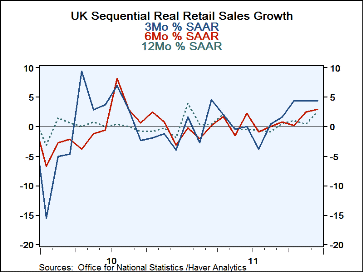 Global| Jan 20 2012
Global| Jan 20 2012UK Retail Sales Begin to Show Recovery
Summary
At the end of 2011 most of the European/EU indicators were showing weakness. But toward the very end of the year some of the most forward-looking surveys Like the PMI measures began to show some stability. It is too soon to jump to [...]
 At the end of 2011 most of the European/EU indicators were showing weakness. But toward the very end of the year
some of the most forward-looking surveys Like the PMI measures began to show some stability. It is too soon to
jump to conclusions and end-of-the-year data can be volatile but markets are starting to get optimistic that Europe’s
slip into recession might be shallow instead of abrupt and might be avoided entirely by some of the large countries.
At the end of 2011 most of the European/EU indicators were showing weakness. But toward the very end of the year
some of the most forward-looking surveys Like the PMI measures began to show some stability. It is too soon to
jump to conclusions and end-of-the-year data can be volatile but markets are starting to get optimistic that Europe’s
slip into recession might be shallow instead of abrupt and might be avoided entirely by some of the large countries.
The UK that has been floundering for some time and sporting high inflation and plunging money growth has all the hallmarks of an economy that should be headed for recession as well. But as 2011 closes the UK is putting on a spurt with retail sale surging at year end and growing in real terms by over 4% in Q4.
The chart shows that the retail revival is embedded in all three major growth rates from 3-Mo to 6-Mo to 12-Mo. That breadth also tends to make the revival look authentic.
Retail sales volumes have seen positive growth since early in the year, but the early year growth rates were quite small and at the time seemed feeble. Now, as the end of the year has come, the pattern for UK sales has come to appear a bit more impressive.
The troubles of the Euro-Area have not gone away but continue and in a rather intense form across Europe. The question is not if some country will slip, but if there will be contagion. Of course, the stronger that growth is, the less vulnerable the region will be to contagion and that in turn will tend to warn off speculation against it. Europe will continue to be touch-and-go through at least the first half of the year. Greece’s situation has dragged on for longer than I would have imagined possible so I will not prognosticate on when Europe will settle its problems – if all.
And while I am not yet impressed that the Euro-Area has figured out what it wants to be when it grows up or that it has crafted a comprehensive sustainable plan it has been able to hold things together. I remain very concerned about the deep-rooted nature of the problems in the Zone and likelihood that only a currency depreciation is likely to fix some of the most dire national cases. But even an exit from the Zone and a currency float is required, that might not be as devastating as many now imagine. I also remain optimistic that if the Zone wants to stay together it will find ways to help its membership take the hard steps needed to fix their problems. There is a chance that it just won’t work. There seems to be more cooperation required than there has been forthcoming. But then push has not come to shove just yet. 2012 may be the year when the Euro-Area faces its test of fire, or it try to muddle through and try to avoid the big divisive issues once again.
For now the UK’s retail sales are one of the new bits of information saying that things are not grim going into 2012. While the EMU and EU seemed to be slipping fast in the second half of 2011 something began to click at year end. In the UK it is retail sales. Will it be enough?
Robert Brusca
AuthorMore in Author Profile »Robert A. Brusca is Chief Economist of Fact and Opinion Economics, a consulting firm he founded in Manhattan. He has been an economist on Wall Street for over 25 years. He has visited central banking and large institutional clients in over 30 countries in his career as an economist. Mr. Brusca was a Divisional Research Chief at the Federal Reserve Bank of NY (Chief of the International Financial markets Division), a Fed Watcher at Irving Trust and Chief Economist at Nikko Securities International. He is widely quoted and appears in various media. Mr. Brusca holds an MA and Ph.D. in economics from Michigan State University and a BA in Economics from the University of Michigan. His research pursues his strong interests in non aligned policy economics as well as international economics. FAO Economics’ research targets investors to assist them in making better investment decisions in stocks, bonds and in a variety of international assets. The company does not manage money and has no conflicts in giving economic advice.
More Economy in Brief
 Global| Feb 05 2026
Global| Feb 05 2026Charts of the Week: Balanced Policy, Resilient Data and AI Narratives
by:Andrew Cates






